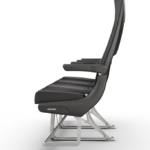Scandinavia’s largest regional airline plans to electrify 30-strong fleet by 2030
Rolls-Royce and Widerøe, the largest regional airline in Scandinavia, have launched a joint research programme on zero-emissions aviation.
The programme is part of the airline´s ambition to replace and electrify its regional fleet of more than 30 planes by 2030. The news was announced at a Clean Aerospace event at the British Embassy in Oslo Norway. Rolls-Royce already has a high-tech electrical research facility based in Trondheim, which employs a group of people dedicated to finding solutions for emission-free aviation.
The aim of the programme is to develop an electrical aircraft concept, not only to fulfil the Norwegian ambition of zero-emissions by 2030, but also to replace Widerøe’s legacy fleet of regional aircraft world-wide.
Rolls-Royce will use its in-depth electrical and systems design expertise to help advise on all elements of the project. The initial phase, which involves operational studies and concept proofing, is already underway, with expert teams in Norway and the UK working closely together.
‘Test bench’ for zero emission aircraft
The Norwegian Government has announced its intention to aim for emission-free domestic aviation by 2040. Widerøe’s research is being supported both by the Norwegian Government and Innovation Norway, and the Minister of Climate and Environment, Ola Elvestuen, who has on several occasions put forward the suitability of the Norwegian STOL network as a test bench for the development of zero-emissions aircraft.
He said: “Our major short runway network of local flights in the coastal and northern parts of the country is ideal for electrification, and our abundant access to clean electricity means this is an opportunity we cannot miss. We are determined to show the world that this is possible, and many will be surprised at how fast it will happen.”
Widerøe management has been travelling the globe to partner with suppliers that can build the zero-emission aircraft they need to replace their Dash8 fleet.
Andreas Aks, Chief Strategy Officer, Widerøe, said: “We are aiming to have emission-free commercial flights in the air by 2030. Partnering with Rolls-Royce for this research programme puts us one step closer to reaching that goal.”
Alan Newby, Director, Aerospace Technology & Future Programmes at Rolls-Royce added: “We’re delighted to be part of this electrical aircraft research programme and applaud the high level of ambition that Norway is adopting toward zero-emissions aviation. Rolls-Royce has a long-standing history of pioneering innovation, from powering early flight to building the world’s most efficient aero engine flying today, the Trent XWB; we relish the opportunity to solve complex problems that matter.”
“Now more than ever, we acknowledge that society’s greatest technological challenge is the need for lower carbon power and we have a crucial role to play in creating cleaner, more sustainable and scalable power for the future. This includes the electrification of flight, in addition to increasing the fuel efficiency of our gas turbines and encouraging the development of sustainable aviation fuels.”

